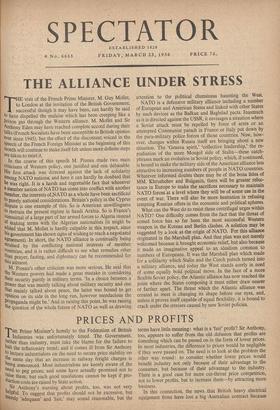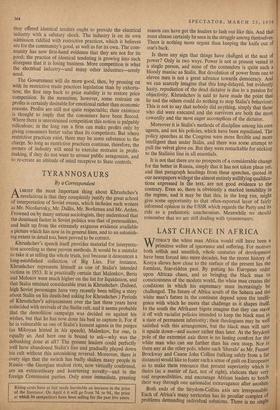PRICES AN D PROFITS
THE Prime Minister's homily to the Federation of British Industries was unfortunately timed. The Government, rather than industry, must take the blame for the failure to halt the inflationary trend; and it comes ill from Sir Anthony t° the inclUstrialists on the need to secure price stability on the same day that an increase in railway freight charges is berg announced. Most industrialists are keenly aware of ,the need to peg prices; and some have actually promised not to raise them; but such good resolUtions cannot be kept if pro- duction costs are raised by State action. , Sir Anthony's warning, abdut profits, too, was not ;very helpful. To suggest that profits should not be excessive, but illerelY 'adequate' and 'fair,' may sound reasonable, but the terms have little meaning: what is a 'fair' profit? Sir Anthony, too, appears to suffer from the old delusion that profits are something which can be passed on in the form of lower prices. In most industries, the difference 'to prices would be negligible if they were passed on. The need is to look at .the problem the other way round : to consider whether lower prices would benefit industry not only because of their advantage to the consumer, but because of 'their advantage to the industry. There is a good case for more cut-throat price competition, not to lower profits, but to increase them—by attracting more business.
In this connection, the news that British heavy electrical equipment firms have lost a big Australian contract because they offered identical tenders ought to provide the electrical industry with a salutary shock. The industry is on its own admission riddled with restrictive practices, which it believes are for the community's good, as well as for its own. The com- munity has now first-hand evidence that they are not for its good; the practice of identical tendering is growing into such disrepute that it is losing business. More competition is what the electrical industry—and many other industries—sorely need.
The Government will do more good, then, by pressing on with its restrictive trade practices legislation than by exhorta- tion; the first step back to price stability is to restore price competition. In the meantime, however, some restraint on profits is certainly desirable for emotional rather than economic reasons. Profits are still not quite respectable; their existence is thought to imply that the consumers have been fleeced. Where there is unrestrained competition this notion is palpably ridiculous; in the long run a firm can make profits only by giving consumers better value than its competitors. But where restrictive practices exist, there may be some substance to the charge. So long as restrictive practices continue, therefore, the owners of industry will need to exercise restraint in profit- making, if they do not want to arouse public antagonism, and to re-create an attitude of mind receptive to State controls.



































 Previous page
Previous page